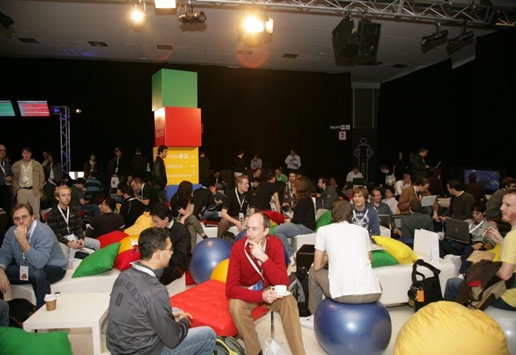Ever had that disconnect where you learn a new concept, but don't have a name for it, and you come across a new term but don't understand the concept, only to realise the new term is actually describing the new concept?
That's happened to me recently with the concept of using Twitter + Hashtags at conferences to keep up with what's happening and the term backchannel. It turns out they are one and the same (and now you know too!).
So, why bother blogging about it? Or more importantly, so why should you care?
Good question. The interesting thing about backchannels is that they not only enrich your conference experience, but they also help you process the sessions you are currently in.
So how does it enrich the experience?
- You get to find out what's going on in other sessions.
At Google Developer Day 2008 this helped me work out that it was worth switching streams when I found the OpenSocial one was not meeting my expectations. - You get the benefit of others' viewpoints.
We all know that sometimes the biggest "aha!" moments around a conference are during those in-between sessions conversations with other participants. Backchannels allows you to get some of those during the session. - You get extra content.
When twitterers know which link the presenter is talking about, or do a bit of impromptu research in the midst of the session, then you get the benefits of finding out more about what is being said and can often be downloading the code being discussed during the session. - You get to give too!
Each of the above benefits is because other people in the backchannel are sharing what they see, know and feel. You get to do the same too, and this reaps benefits in terms of reputation and new contacts. At both CodeCampOz 2008 and Google Developer Day 2008 I met new people who I would have probably not gotten to know except through the conference backchannel. Be aware that the conference speakers may check out the backchannel after their sessions, and set the tone of your comments appropriately. - You've got something constructive to do in boring sessions.
You can always surf the web, but that takes you out of the flow of the conference, being able to participate in a backchannel discussion means that you can sometimes re-assess the usefulness of the current session or at least plan which pub to meet everyone with afterwards more easily!
The other element is more about how you process the sessions in order to internalise the knowledge and practices being shared. Sometimes the fact that you are researching topics in the midst of the session means you can multiply your understanding about a topic at the moment when you're most interested in it.
I certainly found at CodeCampOz that some of the sessions might not have made sense to me were I not pushing myself to find relevant links about them in order to add them to tweets sent during the sessions (yes, backchannels can make you competitive!). It does mean you are paying less attention to the speaker, but sometimes that would have occurred anyway (like when something goes over your head, is boring or relates to a question you already know the answer to).
However, I don't think that I would have grokked the advantages of backchannels had Craig Bailey not pushed me to use Twitter before Code Camp Oz 2008, and then the organisers of that conference not provided free power and wireless internet access. I highly recommend you give it a go yourself.
Why not drop me a comment here if you find it has worked for you, or alternatively if you thought it was a waste of time?

No comments:
Post a Comment